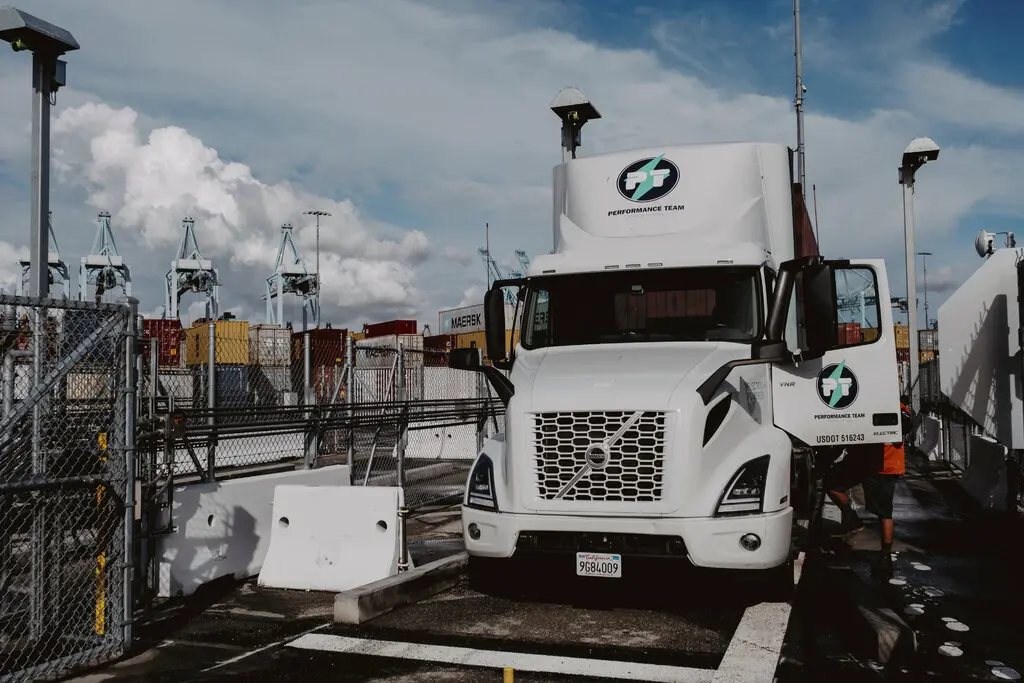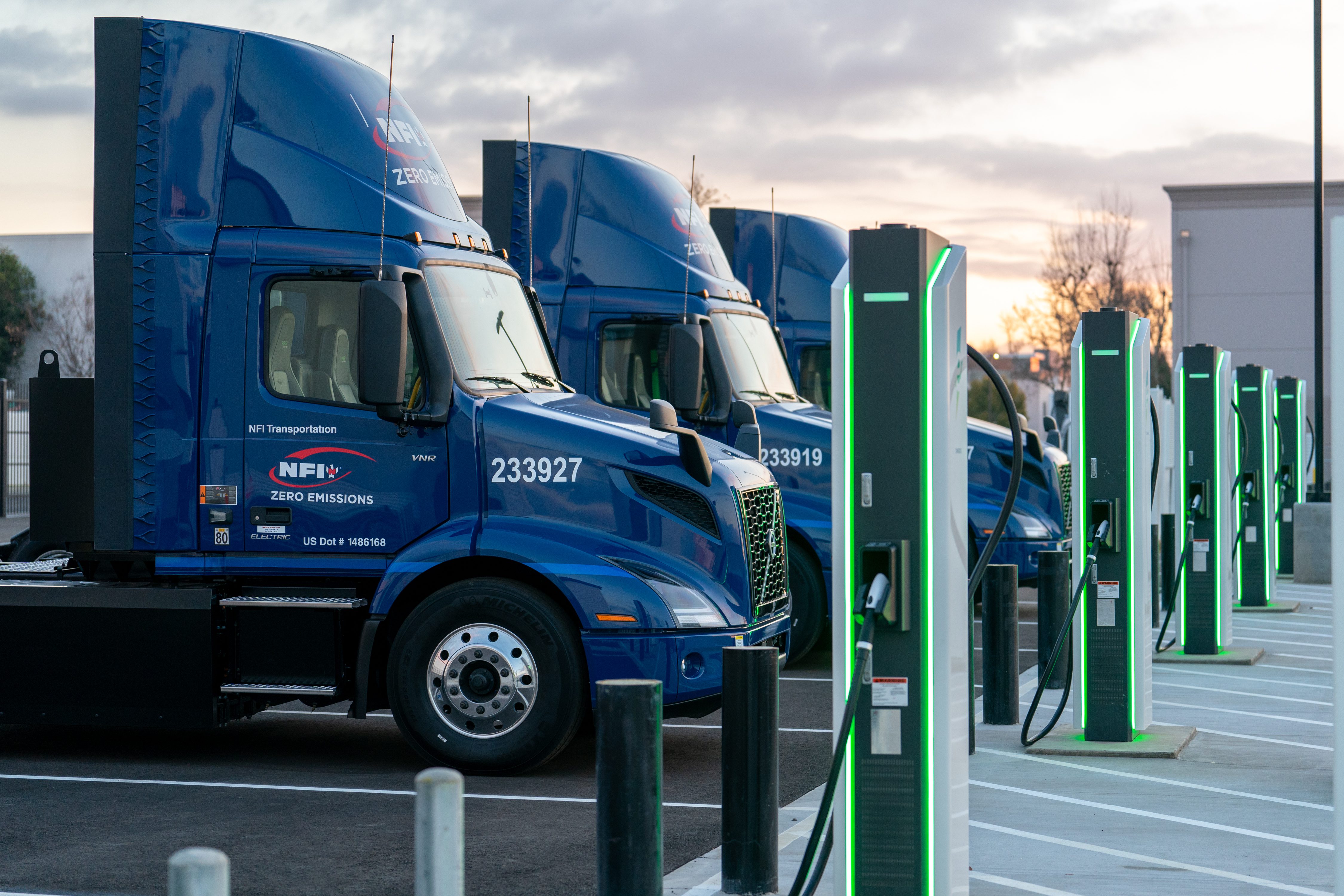Source: South Coast AQMD
The South Coast Air Quality Management District (South Coast AQMD) is leading a landmark effort along
with the California Air Resources Board (CARB) and the California Energy Commission (CEC) to deploy
100 battery-electric regional haul and drayage trucks across California. The battery-electric trucks will be
deployed through a partnership with NFI Industries (NFI) and Schneider.
The project, known as Joint Electric Truck Scaling Initiative, or JETSI, is the largest commercial
deployment of battery-electric trucks in North America to date, helping to significantly increase the
number of zero-emission heavy-duty trucks available for goods movement while achieving necessary
emission reductions. This is the first battery-electric truck project jointly financed by CARB and the CEC,
and the largest investment of its kind.
“We are proud to be a part of this historic initiative here in Southern California,” said South Coast AQMD
Board Member Gideon Kracov. “The agency has always been a leader in innovative collaborations that
help advance zero-emission transportation and protect the health of our communities.”
The project is poised to reduce five tons of pollutants such as nitrogen oxides (NOx) and particulate
matter (PM) annually along Southern California’s I-710 corridor, as well as eliminate 8,247 metric tons of
greenhouse gas emissions. Connecting the San Pedro Bay Port complex to inland distribution centers
and warehouses, the I-710 sees more than twice the average Los Angeles freeway truck traffic and
accounts for 20% of all PM emissions in Southern California. The JETSI project will inform large fleets on
the capabilities of battery-electric trucks to ensure the emission reductions achieved are sustainable and
improve the air quality for communities most impacted.
“Projects like JETSI are needed to help accelerate the large-scale manufacturing of zero-emission trucks.
They also demonstrate to other fleet operators how zero-emission technologies are commercially
competitive, especially when it comes to cost savings on fuel and maintenance,” said CARB Chair Liane
Randolph. “Putting more of these trucks on our roads and highways as soon as we can is a primary goal of the Newsom administration, and crucial to cleaning up the air in communities adjacent to our ports
and along the highways now crammed with diesel-powered trucks.”
Project partners Daimler Trucks North America (DTNA) and Volvo Trucks North America (Volvo Trucks)
will produce and deliver the Class 8 battery-electric trucks (BETs) for deployment in Schneider and NFI’s
Southern California fleet operations. Operating almost exclusively in disadvantaged communities, the
zero-emission trucks will replace the equivalent of more than 690,000 diesel-gallons annually while
helping to accelerate commercialization of heavy-duty battery-electric vehicles across the market.
“We are proud to support JETSI,” said CEC Commissioner Patty Monahan. “Not only will this create good
paying jobs, it will reduce diesel pollution and improve air quality for residents disproportionately
impacted by transportation emissions. This project is demonstrating to the world how electric trucks can
deliver goods efficiently while zeroing out pollution.”
DTNA will deliver 80 battery-electric Freightliner eCascadias, the company’s first all-electric commercial
Class 8 truck, to both Schneider (50 trucks) and NFI (30 trucks). Schneider will deploy the 50 eCascadias
within its intermodal operations in Southern California. Volvo Trucks will deliver another 20 VNR Electric
trucks, an all-electric Class 8 model that the company commercialized in late 2020, to NFI. With the
deployment of a combined 50 BETs at its Ontario facility, NFI will operate the first 100% zero-emission
freight logistics fleet in California. Through the JETSI project, NFI and Schneider will collectively install
significant charging infrastructure (50 chargers total), warehouse upgrades, on-site energy storage and
rooftop solar, resulting in more than $16.8 million of regional economic activity from associated
construction costs. Over 20 project partners representing charging equipment manufacturers,
infrastructure providers, nonprofit organizations, technology suppliers and more will collaborate on the
eight-year project to ensure all aspects of fleet electrification are considered.
The project was funded with $26.98 million from CARB’s California Climate Investments Initiative and
the CEC’s Clean Transportation Program, $5.43 million from South Coast AQMD, as well as $41.37
million in funding from project partners.
JETSI represents an unprecedented industry-wide collaboration among more than 20 public and private
stakeholders. The project was assembled and will be led by South Coast Air Quality Management District
along with support from the California Air Resources Board, California Energy Commission, the Mobile
Source Air Pollution Reduction Review Committee (MSRC), Schneider, NFI Industries, Daimler Trucks
North America, and Volvo Trucks North America. Partners including Green Paradigm Consulting, Power
Electronics, Electrify Commercial, Gladstein, Neandross & Associates (GNA), Coalition for Clean Air,
CALSTART, Electric Power Research Institute, Ricardo Strategic Consulting, Los Angeles Cleantech
Incubator, Black & Veatch, and University of California, Riverside. The Port of Long Beach, Port of Los
Angeles, and Southern California Edison will also be contributing to the project.
About the South Coast Air Quality Management District (South Coast AQMD)
South Coast AQMD is the air pollution control agency for major portions of Los Angeles, Orange, San
Bernardino, and Riverside counties, including the Coachella Valley. For news, air quality alerts, event
updates and more, please visit us at www.aqmd.gov, download our award-winning app, or follow us on
Facebook, Twitter and Instagram.
About the California Air Resources Board (CARB)
CARB’s mission is to promote and protect public health, welfare, and ecological resources through
effective reduction of air pollutants while recognizing and considering effects on the economy. CARB is
the lead agency for climate change programs and oversees all air pollution control efforts in California to
attain and maintain health-based air quality standards. JETSI is part of California Climate Investments, a
statewide initiative that puts billions of Cap-and-Trade dollars to work reducing greenhouse gas
emissions, strengthening the economy, and improving public health and the environment — particularly
in disadvantaged communities.
About the California Energy Commission (CEC)
The California Energy Commission is leading the state to a 100 percent clean energy future. It has seven
core responsibilities: developing renewable energy, transforming transportation, increasing energy
efficiency, investing in energy innovation, advancing state energy policy, certifying thermal power
plants, and preparing for energy emergencies. CEC’s Clean Transportation Program invests up to $100
million annually to support California communities, increase access to zero-emission vehicle
infrastructure, support innovation, and accelerate the deployment of advanced transportation and fuel
technologies.


